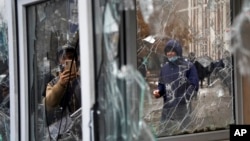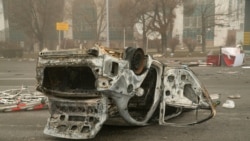Constitutional order has largely been restored to Kazakhstan, President Kassym-Jomart Tokayev said in a statement Friday after a week’s unrest in the Central Asian country.
“Local authorities are in control of the situation. But terrorists are still using weapons and damaging the property of citizens. Therefore, counter-terrorist actions should be continued until the militants are completely eliminated,” the president’s statement said.
Reuters reported that gunshots could still be heard Friday morning in Almaty, the country’s largest city.
The Kazakh Interior Ministry said in a statement Friday that 26 “armed criminals” were “liquidated,” while more than 3,000 had been detained. The ministry also said 18 police and national guard members had been killed since the protests started.
The demonstrations began late last week in the western part of the country in protest of the doubling of fuel prices. But because they have spread across the country so quickly and have grown so large, some political observers are suggesting they reflect wider discontent in the country that has lived under authoritarianism since gaining independence from the Soviet Union in 1991.
In news video taken from the streets of Almaty, security forces — some in armored vehicles — could be seen firing repeatedly into a crowd of protesters in the city's Republic square. A representative from one of the protest groups told Radio Free Europe/Radio Liberty that most of the people in the square were unarmed.
Russian news agency Tass said late Thursday that the square had been cleared of protesters but that sporadic gunfire continued. Reuters and Associated Press also reported sporadic gunfire.
"I didn't know our people could be so terrifying," Samal, a nursery school teacher, told AFP near the presidential residence, where bullet casings littered the ground.
Thursday's crackdown comes a day after the protests — which began days earlier over a jump in fuel prices — turned violent, with thousands of people, some reportedly armed with clubs and shields, taking to the streets, storming government buildings and setting some on fire, including the president's residence.
As Kazakh security forces lost control of the situation, Kazakh President Tokayev requested Russian military intervention under the terms of the so-called collective security treaties that exist among several formerly Soviet countries.
As Russian-led troops began arriving in Kazakhstan on Thursday, the United States warned them not to seize control of Kazakh institutions.
"The United States and, frankly, the world will be watching for any violation of human rights," State Department spokesperson Ned Price told reporters.
"We hope that the government of Kazakhstan will soon be able to address problems which are fundamentally economic and political in nature," Price added, saying the U.S. is a "partner" of the Central Asian nation.
In a nationally televised address on Wednesday, Tokayev declared a state of emergency and referred to the protesters as well-organized thugs and terrorists with outside support, which he did not identify, and promised to deal with them harshly.
U.S. Secretary of State Antony Blinken spoke on Thursday with Kazakhstan Foreign Minister Mukhtar Tileuberdi regarding the ongoing state of emergency, according to a statement from State Department spokesperson Price. Blinken reiterated full U.S. support for "Kazakhstan's constitutional institutions and media freedom and advocated for a peaceful, rights-respecting resolution to the crisis," Price said.
Some information for this report came from The Associated Press, Reuters, and Agence France-Presse.






